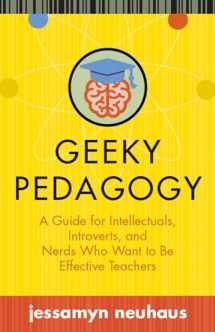
Geeky Pedagogy: A Guide for Intellectuals, Introverts, and Nerds Who Want to Be Effective Teachers (Teaching and Learning in Higher Education)
Book details
Summary
Description
Excerpt. © Reprinted by permission. All rights reserved. Introduction“Strange, Specific Stuff”Just because you know a lot about something doesn’t mean you can teach it.—Anonymous 1998 student evaluation I received after teaching my first college classIt’s hard to write a catchy statement of teaching philosophy. Required by many hiring and promotion committees, these nebulous documents tend to sound pretty much all alike. When I was applying for college teaching jobs, I tried to liven up and personalize my teaching philosophy statement with this true anecdote:Learning how to read in first grade was the best thing that had ever happened to me. I still vividly remember the moment the words on the page started to make sense, and the feeling it gave me of unlocking a secret door and entering a wonderful new world. Afire with my discovery, I decided that my sister Alison, a kindergartener, should learn how to read too. After several weeks of sitting together and poring over books, Alison learned to read a year before her classmates and my career as an educator began.Cute story and a good way to introduce myself as a teacher, right? I know at least one search committee thought so because during my interview for the tenure-track job I eventually landed teaching US history and popular culture at the State University of New York Plattsburgh, one of the department’s most esteemed teachers complimented me on it.There’s just one little problem with framing my philosophy of college teaching through the lens of this particular childhood story: it illustrates the very worst assumption many of us make about teaching at the college level, namely, that sheer love of a subject inevitably leads to effective teaching and student learning. In my story it’s not a desire to teach that makes me a teacher but instead an all-consuming passion for reading. There’s no need for me to learn how to teach someone else to read because purely through some mysterious alchemy conferred by my own mastery of reading skills and adoration for books, I’m able to impart these skills to another person effortlessly. This is the problematic premise of college teaching because earning an advanced degree is the main criteria for most college teaching jobs, usually with no additional formal preparation for teaching required. But as the reality check given to me by my first student evaluation of teaching pointed out, although it’s a necessary precursor, knowing a lot about a subject doesn’t necessarily mean that you can effectively teach other people how to do things in and with that subject matter.Yet many advanced degree programs offer little meaningful professional teaching development for their students. Instead, graduate students spend years immersed in their own research, experiments, writing, or art, and completing a dissertation, which literature professor Jay Parini calls “the worst possible preparation for teaching.”1 If grad students do get classroom experience as teaching assistants, programs often send them into the teaching fray with the unspoken supposition that any teaching they have to do will be the grunt work that (partially) pays the bills and thus allows them to continue their real work—the work of the mind. This isn’t the case at every institution, and the growing presence of teaching and learning centers on campuses and increased attention to pedagogy as part of graduate school is a hopeful sign that more students are finding support for developing their teaching skills.However, the basic model remains firmly in place, and many people teaching college classes today followed this process. Step One: Spend at least a decade grappling with an erudite subject and proving how smart you are to other smart people who know a massive amount about said erudite subject and who, like you, believe the erudite subject is incredibly important and have devoted their professional lives to it. Step Two: If the stars align and you are fantastically lucky, obtain a job


We would LOVE it if you could help us and other readers by reviewing the book
Book review



